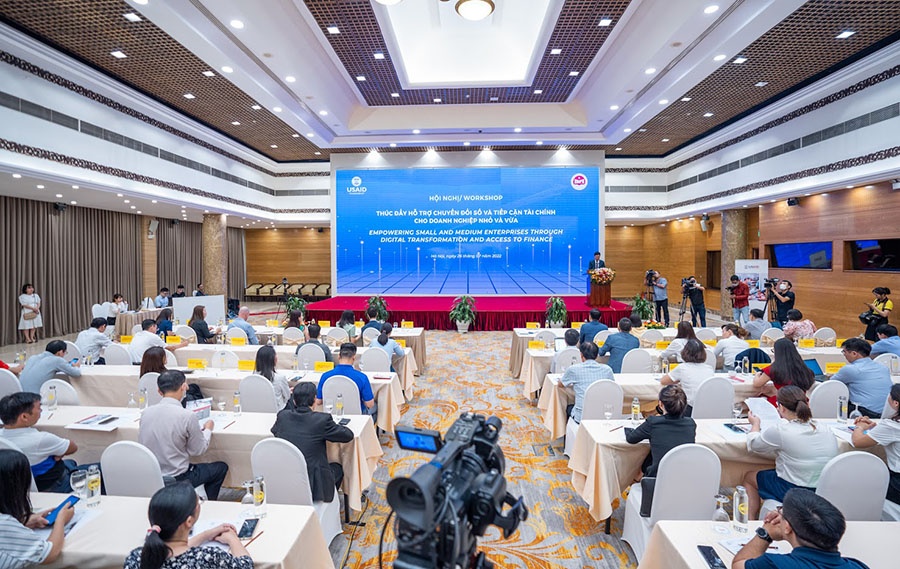Uplifted vista for SMEs in digitalisation and finance accessing
 |
The seminar welcomed Le Manh Hung, director of the Agency for Enterprise Development (AED) under the Ministry of Planning and Investment; Gregory Leon, director of Governance and Economic Growth Office at USAID Vietnam; and other partners from various sectors including banks, telecommunications, manufacturing businesses, and the press.
“In the process of recovering from the pandemic, small and medium-sized businesses (SME) face significant obstacles and problems. In this context, digital transformation and access to finance are prerequisites for assisting businesses in coping with new challenges, recovering, expanding production and business, and enhancing competitive advantages,” said Hung.
 |
| Seminar on digital transformation and financial access at the conference |
Bui Thu Thuy, deputy director of the AED, cited the following four issues that enterprises currently face: Expenses incurred for change are substantial; technology infrastructure of enterprises is still limited and coupled with fear of innovation; organisational processes and supply chain management have not been standardised; and there is a lack of expertise and adaptability in terms of modifying organisational culture and awareness of digital transformation.
Therefore, firms would be worried about the loss of personal information throughout the digital transformation process.
“Meanwhile, with access to finance, businesses have not satisfied the requirements for bank loans owing to challenges with collateral, viable business ideas, payback history, and other loan conditions and processes. The number of SMEs with access to official financial sources is still low, at around 25 per cent; with the remaining 75 per cent coming from informal sources, such as friends, family, and non-bank loans. This is the reason why it is difficult for firms to receive official capital from banks," according to Thuy.
Dao Gia Hung, deputy director of VPBank told VIR, “In addition to achieving the basic criteria of the state's lending legislation, two additional factors are essential for banks to consider when evaluating a prospective SME for capital financing. The first need is a solid financial sheet and sufficient debt repayment capabilities. The second requirement is that the bank's historical loan repayment record must be punctual and precise.”
In order to participate sustainably in domestic and international supply chains, the mission of the conference was to counsel, encourage, and support the demands of digital transformation, as well as provide information on financial matters, so that SMEs may recover and flourish in the future with ease after the pandemic.
 |
| Gregory Leon, director of the Department of State Governance and Economic Development at USAID Vietnam spoke at the workshop |
USAID's Leon stated that in 2021 and the first six months of 2022, nearly 400,000 businesses had access to digital transformation manuals, more than 600 businesses had their readiness assessed, and 100 enterprises were consulted and supported in-depth on digital transformation.
SMEs may access digital information-based tools through digital.business.gov.vn and a2f.business.gov.vn. Businesses can get technical help, training, and access to new financial sources.
In the future, the MPI and USAID LinkSME will continue to emphasise supporting and extending operations to assist SMEs in connecting, undergoing digital transformation, and gaining access to finance.
"Hopefully these efforts will be appropriate support functions to assist companies to comprehend the expansion and changing patterns of the local and international markets so that they can adapt, react, endure, and continue to expand firmly," Hung underlined.
What the stars mean:
★ Poor ★ ★ Promising ★★★ Good ★★★★ Very good ★★★★★ Exceptional
 Tag:
Tag:
Themes: Digital Transformation
- PM sets five key tasks to accelerate sci-tech development
- Ho Chi Minh City launches plan for innovation and digital transformation
- Dassault Systèmes and Nvidia to build platform powering virtual twins
- Sci-tech sector sees January revenue growth of 23 per cent
- Advanced semiconductor testing and packaging plant to become operational in 2027
Related Contents
Latest News
More News
- Ho Chi Minh City attracts nearly $980 million in FDI in early 2026 (March 02, 2026 | 10:57)
- Businesses bouncing back after turbulent year (February 27, 2026 | 16:42)
- VinaCapital launches Vietnam's first two strategic-beta ETFs (February 26, 2026 | 09:00)
- PM sets five key tasks to accelerate sci-tech development (February 26, 2026 | 08:00)
- PM outlines new tasks for healthcare sector (February 25, 2026 | 16:00)
- Citi report finds global trade transformed by tariffs and AI (February 25, 2026 | 10:49)
- Vietnam sets ambitious dairy growth targets (February 24, 2026 | 18:00)
- Vietnam, New Zealand seek level-up in ties (February 19, 2026 | 18:06)
- Untapped potential in relations with Indonesia (February 19, 2026 | 17:56)
- German strengths match Vietnamese aspirations (February 19, 2026 | 17:40)






















 Mobile Version
Mobile Version